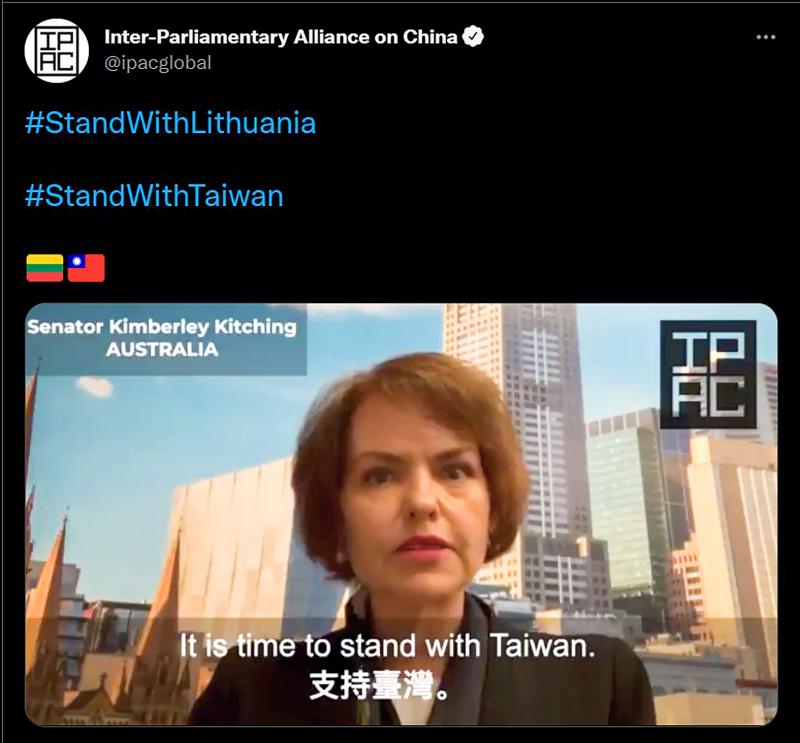Members of the Inter-Parliamentary Alliance on China (IPAC) yesterday called for global solidarity with Taiwan and Lithuania, as the nations face intense pressure from the Chinese government.
In a video statement posted on Twitter, IPAC members appealed to democratic countries to stand “shoulder-to-shoulder” with Lithuania, and raise awareness of China’s retaliatory tactics against nations such as Taiwan and Lithuania.
The statement from the alliance of more than 100 lawmakers from 19 countries and blocs came as Lithuania faces retribution from Beijing for exiting a cooperation framework between China and central and eastern European countries, calling out human rights abuses in Xinjiang and allowing Taiwan to establish a representative office in Vilnius under the name “Taiwan” rather than “Taipei.”

Photo: screen grab from Twitter
The office is to be named the “Taiwanese Representative Office in Lithuania.”
To avoid conflict with China, countries with which Taiwan does not have diplomatic relations tend to call Taiwan’s de facto embassies in their jurisdiction the “Taipei Economic and Cultural Office” or “Taipei Representative Office.”
Lithuania’s decision has angered the Chinese government, which launched various reprisals against the country, such as recalling its ambassador from Vilnius and expelling Lithuania’s ambassador from Beijing.
China has also introduced various trade sanctions, including halting direct freight train services to the Baltic state in retribution.
“The Chinese Government is carrying out a campaign of threats and intimidation against the Lithuanian people,” Lithuanian lawmaker Dovile Sakaliene said in the video that featured IPAC members from 12 legislatures across Europe, and in Australia, Japan and New Zealand.
Sakaliene is a member of Seimas, the Lithuanian parliament, and one of several IPAC members to have been targeted by Chinese retaliation.
“Once again, the Chinese government is using its economic might to coerce smaller states into acquiescence,” said Elisabet Lann, Deputy Mayor for the Christian Democrats in Gothenburg, Sweden.
French Senator Andre Gattolin echoed Lann’s remarks.
“We commend the courage of the Lithuanian and Taiwanese people, and we call for democratic states everywhere to take a united stand against Beijing’s coercive diplomacy,” he said.
IPAC was founded last year as an international coalition to create a coordinated response to China on global security, human rights and trade issues. It has previously initiated movements encouraging governments to back Taiwan’s inclusion at the World Health Assembly, and voiced its support for Australian wine producers who were affected by Chinese trade sanctions.

WANG RELEASED: A police investigation showed that an organized crime group allegedly taught their clients how to pretend to be sick during medical exams Actor Darren Wang (王大陸) and 11 others were released on bail yesterday, after being questioned for allegedly dodging compulsory military service or forging documents to help others avoid serving. Wang, 33, was catapulted into stardom for his role in the coming-of-age film Our Times (我的少女時代). Lately, he has been focusing on developing his entertainment career in China. The New Taipei District Prosecutors’ Office last month began investigating an organized crime group that is allegedly helping men dodge compulsory military service using falsified documents. Police in New Taipei City Yonghe Precinct at the end of last month arrested the main suspect,

LITTORAL REGIMENTS: The US Marine Corps is transitioning to an ‘island hopping’ strategy to counterattack Beijing’s area denial strategy The US Marine Corps (USMC) has introduced new anti-drone systems to bolster air defense in the Pacific island chain amid growing Chinese military influence in the region, The Telegraph reported on Sunday. The new Marine Air Defense Integrated System (MADIS) Mk 1 is being developed to counter “the growing menace of unmanned aerial systems,” it cited the Marine Corps as saying. China has constructed a powerful defense mechanism in the Pacific Ocean west of the first island chain by deploying weapons such as rockets, submarines and anti-ship missiles — which is part of its anti-access/area denial (A2/AD) strategy against adversaries — the

Eleven people, including actor Darren Wang (王大陸), were taken into custody today for questioning regarding the evasion of compulsory military service and document forgery, the New Taipei District Prosecutors’ Office said. Eight of the people, including Wang, are suspected of evading military service, while three are suspected of forging medical documents to assist them, the report said. They are all being questioned by police and would later be transferred to the prosecutors’ office for further investigation. Three men surnamed Lee (李), Chang (張) and Lin (林) are suspected of improperly assisting conscripts in changing their military classification from “stand-by

Former Taiwan People’s Party chairman Ko Wen-je (柯文哲) may apply to visit home following the death of his father this morning, the Taipei Detention Center said. Ko’s father, Ko Cheng-fa (柯承發), passed away at 8:40am today at the Hsinchu branch of National Taiwan University Hospital. He was 94 years old. The center said Ko Wen-je was welcome to apply, but declined to say whether it had already received an application. The center also provides psychological counseling to people in detention as needed, it added, also declining to comment on Ko Wen-je’s mental state. Ko Wen-je is being held in detention as he awaits trial